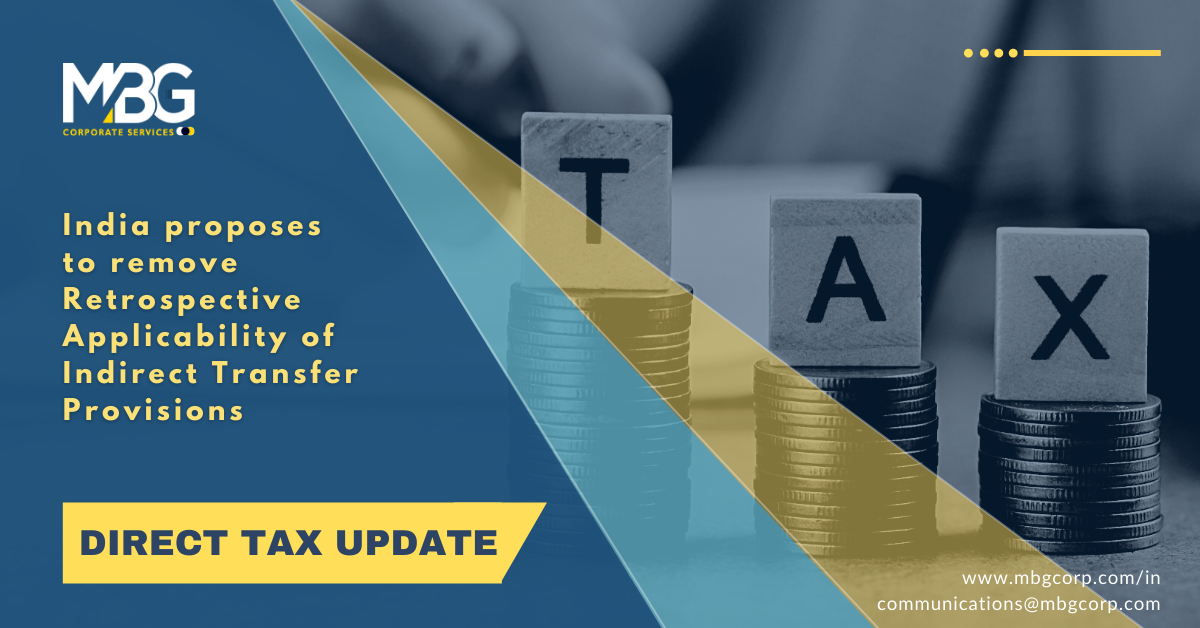Direct Tax Alert
India proposes to remove retrospective applicability of indirect transfer provisions
August 14, 2021

Background
- The issue of taxability of gains arising from the transfer of assets located in India, through the transfer of the shares of a foreign company (known as ‘indirect transfer of Indian assets’), has been a subject matter of protracted litigation. The Supreme Court in 2012 had held that gains arising from indirect transfer of Indian assets are not taxable under the extant provisions of the Income-tax Act, 1961 (ITA).
- Subsequently, the relevant provisions of the ITA were amended by the Finance Act, 2012 (FA 2012) [with retrospective effect from 1 April 1962], to clarify that gains arising from sale of shares of a foreign company are taxable in India, if such share(s), directly or indirectly, derive(s) value substantially from the assets located in India. The FA 2012 also provided for validation of demand, etc. under ITA for cases relating to indirect transfer of Indian assets.
- As per section 9(1)(i) of the ITA, income deemed to accrue or arise in India includes all income accruing or arising, whether directly or indirectly, through or from any business connection in India, or through or from any property in India, or through or from any asset or source of income in India, or through the transfer of a capital asset situate in India.
- Amongst others, the FA 2012 had introduced Explanation 5 to Section 9 of the ITA (relating to income deemed to accrue or arise in India) [with retrospective effect from 1 April 1962], as per which an asset or a capital asset being any share or interest in a company or entity registered or incorporated outside India shall be deemed to be and shall always be deemed to have been situated in India, if the share or interest derives, directly or indirectly, its value substantially from the assets located in India.
- The retrospective effect of said amendments made by the FA 2012, invited criticism from stakeholders. Further, representations were also received from various stakeholders to rationalise and amend some of the retrospective amendments brought in by FA 2012.
- In view of the above, ‘The Taxation Laws (Amendment) Bill, 2021’ (Bill) has been introduced in the Lok Sabha on 5 August 2021, passed by Lok Sabha on 6 August 2021 and by Rajya Sabha on 9 August 2021 to relax and amend certain provisions of the ITA relating to indirect transfer. With the assent of President of India on 13 August 2021, the Bill has now become Taxation Laws (Amendment) Act, 2021.
Key Highlights of the Taxation Laws (Amendment) Act, 2021
- No tax demand shall be raised in future based on the retrospective amendment brought in by FA 2012 for any indirect transfer of Indian assets if the transaction was undertaken before 28 May 2012 (i.e. the date on which the FA 2012 received the President’s assent). In this regard, as per the Taxation Laws (Amendment) Act, 2021, the provisions of the ITA in respect of income from ‘indirect transfers’ made before 28 May 2012 would not apply to:
- An assessment or reassessment to be made under ITA; or
- A rectification order to be passed under ITA enhancing assessment or reducing refund already made or increasing the liability; or
- An order to be passed deeming a person to be an assessee in default relating to consequences of failure to deduct applicable tax at source.
- Demand raised for indirect transfer of Indian assets made before 28 May 2012 shall be nullified on fulfilment of specified conditions such as:
- The relevant taxpayer/ person shall withdraw or submit an undertaking to withdraw (in prescribed form and manner) any appeal before an appellate forum or any writ petition before the High Court or the Supreme Court against any order in respect of the said income;
- The relevant taxpayer/ person shall withdraw or submit an undertaking to withdraw (in prescribed form and manner) the claim in any proceeding for arbitration, conciliation or mediation which has been initiated or where notice has been given thereof, under any law for the time being in force or under any agreement between India and any country / territory outside India, whether for protection of investment or otherwise;
- The relevant taxpayer/ person shall furnish an undertaking (in prescribed form and manner), waiving his right (direct or indirect), to seek or pursue any remedy or any claim in relation to the said income (which may otherwise be available to him under any law for the time being in force, in equity, under any statute or under any agreement between India and any country / territory outside India, whether for protection of investment or otherwise); and
- Such other conditions as may be prescribed.
- On fulfilment of the prescribed conditions, in respect of income accruing or arising through or from ‘indirect transfer’ made before 28 May 2012 and the taxpayer/ person in whose case such assessment or reassessment or order has been passed or made (to the extent it relates to such income), shall be deemed never to have been passed or made.
- Further, where any amount becomes refundable to such taxpayer/ person on fulfilment of specified conditions, then, such amount shall be refunded to the taxpayer/ person without any interest.
The proposed amendments shall create the atmosphere of certainty and attract foreign investments in India.
Last updated: 16/08/2021
Article contributed by:
Manager - Taxation
Also Read:-
- Tax Exemptions & Extension of time limits for compliances of Income Tax
- CBDT issued clarificatory guidelines for TDS on Purchases
- CBDT prescribed the valuation rule for computing FMV of the undertaking transferred under “Slump Sale”
- Direct Tax Alert: Extension of various Income Tax due dates by CBDT vide Notification No. 10/2021
- SC directed CBDT to decide on the relief to be provided to NRIs in lieu of COVID-19









